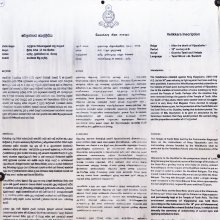Mulla, Mullā: 6 definitions
Introduction:
Mulla means something in Marathi, Jainism, Prakrit, Hindi, biology. If you want to know the exact meaning, history, etymology or English translation of this term then check out the descriptions on this page. Add your comment or reference to a book if you want to contribute to this summary article.
Images (photo gallery)
Biology (plants and animals)
Source: Google Books: CRC World Dictionary (Regional names)Mulla in India is the name of a plant defined with Jasminum sambac in various botanical sources. This page contains potential references in Ayurveda, modern medicine, and other folk traditions or local practices It has the synonym Mogorium goaense Zuccagni (among others).
Example references for further research on medicinal uses or toxicity (see latin names for full list):
· Cytologia (1992)
· Flora of the British India (1882)
· Prodromus Stirpium in Horto ad Chapel Allerton vigentium (1796)
· Journal of Cytology and Genetics (1991)
· Prodr. (DC.) (1844)
· Journal of Cytology and Genetics (1989)
If you are looking for specific details regarding Mulla, for example side effects, chemical composition, pregnancy safety, health benefits, extract dosage, diet and recipes, have a look at these references.

This sections includes definitions from the five kingdoms of living things: Animals, Plants, Fungi, Protists and Monera. It will include both the official binomial nomenclature (scientific names usually in Latin) as well as regional spellings and variants.
Languages of India and abroad
Marathi-English dictionary
Source: DDSA: The Molesworth Marathi and English Dictionarymullā (मुल्ला).—m ( A) More commonly although less correctly mulanā.
Source: DDSA: The Aryabhusan school dictionary, Marathi-Englishmullā (मुल्ला).—m A Mohammedan jurist. A school-master.
Marathi is an Indo-European language having over 70 million native speakers people in (predominantly) Maharashtra India. Marathi, like many other Indo-Aryan languages, evolved from early forms of Prakrit, which itself is a subset of Sanskrit, one of the most ancient languages of the world.
Hindi dictionary
Source: DDSA: A practical Hindi-English dictionaryMullā (मुल्ला):—(nm) a Muslim priest; a Muslim teacher of the Qoran; —[kī dauḍa masjita taka] a priest goes no farther than the Church.
...
Prakrit-English dictionary
Source: DDSA: Paia-sadda-mahannavo; a comprehensive Prakrit Hindi dictionaryMulla (मुल्ल) in the Prakrit language is related to the Sanskrit word: Mūlya.
Mulla has the following synonyms: Mullia.
Prakrit is an ancient language closely associated with both Pali and Sanskrit. Jain literature is often composed in this language or sub-dialects, such as the Agamas and their commentaries which are written in Ardhamagadhi and Maharashtri Prakrit. The earliest extant texts can be dated to as early as the 4th century BCE although core portions might be older.
Kannada-English dictionary
Source: Alar: Kannada-English corpusMulla (ಮುಲ್ಲ):—[noun] = ಮುಲ್ಲಾ [mulla].
--- OR ---
Mullā (ಮುಲ್ಲಾ):—
1) [noun] a Muslim teacher or interpreter of the religious law; a mullah.
2) [noun] a man who teaches languages as Arab, Parsian, etc.
Kannada is a Dravidian language (as opposed to the Indo-European language family) mainly spoken in the southwestern region of India.
See also (Relevant definitions)
Starts with (+52): Mulla banti, Mulla korinda, Mulla mottu, Mulla puchha aku, Mulla thota-kura, Mulla-dantu, Mulla-rasanam, Mullaanki, Mullabanthi, Mullaca, Mullach-cha-pu, Mulladantu, Mullagase, Mullagobbi, Mullah, Mullai, Mullai-yaltiram, Mullaiccuttu, Mullaikkodi, Mullaikkulal.
Ends with (+35): Adavimulla, Akasha-mulla, Attuneermulla, Attunirmulla, Chirakamulla, Churimulla, Chuttimulla, Cirakamulla, Eeshvaramulla, Eswaramulla, Irumulla, Ishvaramulla, Isvaramulla, Kadumulla, Kakkamulla, Kana-mulla, Kathamulla, Kathmulla, Kattuchirakamulla, Kattucirakamulla.
Full-text (+59): Kudda-mulla, Mulla banti, Katu-pitsjegam-mulla, Mullah, Kurukutti-mulla, Nalla-mulla, Mulla puchha aku, Pitsjegam-mulla, Mulla-dantu, Mulla mottu, Mulla thota-kura, Mulla korinda, Tsjiregam-mulla, Katu-tsjiregam-mulla, Tsjeru-mulla, Katu-mulla, Kana-mulla, Mullia, Monar, Mulya.
Relevant text
Search found 10 books and stories containing Mulla, Mullā; (plurals include: Mullas, Mullās). You can also click to the full overview containing English textual excerpts. Below are direct links for the most relevant articles:
Goodwill Mission to Pakistan < [January 1954]
Fundamental Rights and The Judiciary < [October 1967]
Tulsidas-A World Poet < [October - December 1974]
Vastu-shastra (5): Temple Architecture (by D. N. Shukla)
Temple architecture in Nepal < [Chapter 12 - History of Hindu Temples (Prāsādas and Vimānas)]
Indian Medicinal Plants (by Kanhoba Ranchoddas Kirtikar)
48. Cissampelos pareira, Linn. < [Menispermaceae (moonseed family)]
Ramayana of Valmiki (by Hari Prasad Shastri)
Chapter 6 - The city of Ayodhya < [Book 1 - Bala-kanda]
Parables of Rama (by Swami Rama Tirtha)
Story 261 - Result of selfish and deceitful action < [Chapter LVI - Selfishness]
A Manual of Khshnoom (by Phiroz Nasarvanji Tavaria)
